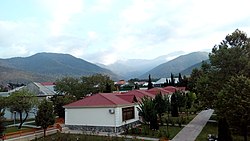Oğuz (city)
Oghuz | |
|---|---|
City & Municipality | |
| Azerbaijani: Oğuz | |
 Afra Hotel, Oghuz | |
| Coordinates: 41°04′15″N 47°27′30″E / 41.07083°N 47.45833°E | |
| Country | |
| District | Oghuz |
| Established | 1968 |
| Elevation | 630 m (2,070 ft) |
| Population (2010)[1] | |
| • Total | 7,002 |
| Time zone | UTC+4 (AZT) |
| • Summer (DST) | UTC+5 (AZT) |
| Area code | +994 024 |
Oğuz (Oghuz) is a city, municipality and the capital of the Oghuz District of Azerbaijan. The village was populated by Armenians and Udis before the exodus of Armenians from Azerbaijan after the outbreak of the Nagorno-Karabakh conflict.[2]
Etymology[edit]
Before 1991 the town was called Vartashen (Armenian: Վարդաշեն), which means town of roses in Armenian; 'Vard' meaning rose and 'shen' meaning town or village. This is in reference to the abundance of roses that naturally grow in this place.[3] A colophon on Armenian manuscript dating to 1466[4] suggests possibly earlier bilingual variants of the name: Giwlstan (Armenian: Գիւլստան), and Vardud (Armenian: Վարդուդ).
The town was renamed to Oghuz in 1991 during the expulsion of the Armenian and autochthonous Udi-speaking population.[2][5] The name Oghuz, given to the town in 1991, was taken from the old Turkic tribe of Oghuz.
Population[edit]
Until 1991, Vartashen was mainly a Udi village, where the Vartashen dialect of the Udi language was spoken by about 3000 people in the 1980s. The Udis of Vartashen belonged to the Armenian and Gregorian Church and had Armenian surnames.
During the Nagorno-Karabakh conflict, most Udis of the town were expelled by the local activists of Popular Front of Azerbaijan. The Udis, bearing Armenian names and belonging to both the Armenian and the Gregorian Church, had been viewed as Armenians and hence suffered the same fate as other Armenians in Azerbaijan. Some 50 Udi people remained in the town.[2]
There were also Tat-speaking Mountain Jews in Vartashen. Most of them have emigrated to Israel, but possibly 80 have stayed.[6][7]
Twin towns — sister cities[edit]
Oghuz is twinned with:
 Nova Gorica, Slovenia
Nova Gorica, Slovenia
References[edit]
- ^ World Gazetteer: Azerbaijan [dead link] – World-Gazetteer.com
- ^ a b c Wolfgang Schulze: Towards a History of Udi. Archived 2020-12-04 at the Wayback Machine International Journal of Diachronic Linguistics 1, 2005, pp. 55–91.
- ^ Jost Gippert «Relative Clauses in Vartashen Udi Preliminary Remarks» «Iran and the Caucasus» Brill Publishers 2011. Стр. 208: The Armenian-based etymology given there (Arm. vard ‘rose’ and šēn ‘village’, i.e. ‘rose-village’) seems first to have been proposed by A. Berger (Berže) as it is also found in Seidlitz 1863: 171 (where, however, the name is spelt ‘Wartaschîn’). The Udi pronunciation of today is vartašen.
- ^ "Colophons of Armenian Manuscripts (1466)". digilib.aua.am (in Armenian). Archived from the original on 2021-06-05. Retrieved 2021-06-04.
- ^ "Azərbaycan Respublikasının Bakı, Gəncə və Sumqayıt şəhərlərinin, Abşeron, Ağdaş, Ağsu, Ağcabədi, Balakən, Bərdə, Beyləqan, Vartaşen, Quba, Qutqaşen, Daşkəsən, İmişli, Yevlax, Kəlbəcər, Kürdəmir, Gədəbəy, Goranboy, Laçın, Lerik, Lənkəran, Mirbəşir, Puşkin, Saatlı, Füzuli, Cəbrayıl və Şamxor rayonlarının, Dağlıq Qarabağ Muxtar Vilayəti Şuşa rayonunun inzibati ərazi bölgüsündə qismən dəyişikliklər edilməsi haqqında AZƏRBAYCAN RESPUBLİKASI ALİ SOVETİNİN QƏRARI". www.e-qanun.az. Archived from the original on 2 June 2021. Retrieved 2 June 2021.
- ^ Sarah Marcus: Mountain Jews. Archived 2018-01-19 at the Wayback Machine Tablet, Tbilisi, 18. Januar 2018.
- ^ Michael Zand: Language and Literature. In: Liya Mikdash-Shamailov: Mountain Jews: Customs and Daily Life in the Caucasus. The Israel Museum (Muzeon Yisrael), Jerusalem 2002, p. 37. Archived 2018-01-19 at the Wayback Machine
External links[edit]
- Oğuz (city) at GEOnet Names Server
- Бежанов М. Краткие сведения о селе Варташен и его жителях // СМОМПК. Тифлис, 1892. Вып. 14.[permanent dead link]
41°04′15″N 47°27′30″E / 41.07083°N 47.45833°E


